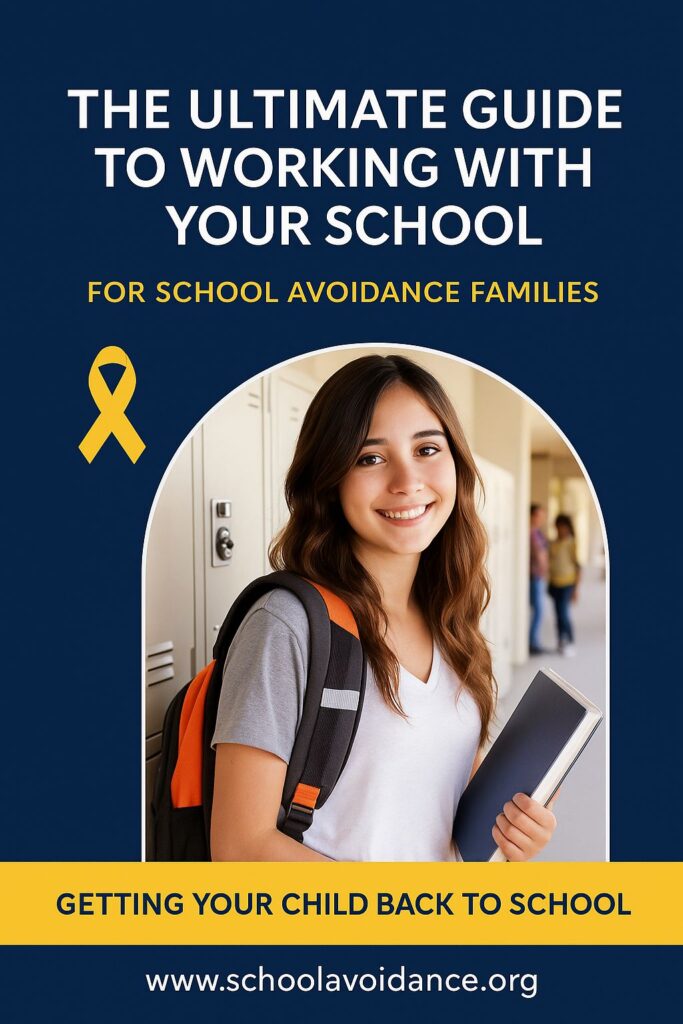Establishing a good working relationship with your school is crucial to your advocacy for your child with school avoidance.
Your school is part of your team to help get your child back to school.

When parents start seeing signs of school avoidance, it’s time to let the school know. You may be unsure if this is the start of an ongoing problem but remember earlier interventions = best outcomes. So, it is worth it to let the school know and see how they may be able to help at this time.
Retroactively looking for help with no notice to the school district can negatively influence possible future support and intervention services.
The following sections cover how to work with your school and your protections under federal and state laws.
As you work to get your child back to school, you will be engaging with school staff for their assistance. The good news is that there are federal and state laws to protect your child’s rights to a Free Appropriate Public Education. Your local school district also must detail its guidelines and timeframes, so use this information as your roadmap.
Some schools are unclear or inexperienced about how to help get your child back to school.
The factors above leave room for misinterpretation, misunderstanding, and mistakes when schools need to adhere to:
The Individuals with Disabilities Education Act (IDEA)
Federally mandated under the U.S. Department of Education
Section 504
Federally enforced by the U.S. Department of Education and their Office of Civil Rights (OCR)
When you seek school assistance for your child with school avoidance, your first point of contact depends on your specific situation.
It is your right at any time to:
Request a meeting with the School-Based Intervention Team (a/k/a Student Intervention Team, Intervention & Referral Team, and other similar names). If you cannot find this group, they are known as the Response To Intervention Team (RTI).
All requests for assistance should be made in writing. This documents your request to ensure a timely response, actionable assistance, and protects your rights.
Fostering a professional, courteous and communicative relationship with your child’s school staff will help as you work on strategies to help get your child back to school. But you still must operate knowing that you know your child best. You are your child’s number one advocate.
You should find your state’s
Attorney Jose Martin notes; Even if you determine a 504 plan or IEP is what your child needs, you can request assistance from your school intervention team while waiting for responses, requests, decisions, and implementations from the 504 team or your child study team regarding an IEP.
We know how important it is to get assistance and interventions as soon as possible for school avoidance. So, consider getting help from the intervention team while you proceed along toward your other options (504, IEP).
Part of the problem with school avoidance is that many schools have not been trained or educated about school avoidance.
For this reason, parents also have to take on the role of educator. It is in our kid’s best interest to do this.
You may be at your wit’s end dealing with your child’s emotional needs and the disruption their school avoidance generates. So, taking on the role of educator may seem daunting to you.
Luckily, we have all the information on this website you can use to share with your school.
The educator section on our site has valuable information that you should share with your school.
The image above is a screenshot of that page and if you click it, it will take you there.
Unfortunately only a small percentage of school professionals, therapists, educational advocates and policy makers understand school avoidance best practices. So, you must become the expert to ensure your child is getting:
The time passing slowly without progress is the worst feeling. It wouldn’t have taken five years of suffering and uncertainty if I had this expert guidance during my son’s school avoidance. We would have saved $29,000 in lawyer fees and $69,000 for private schools.
